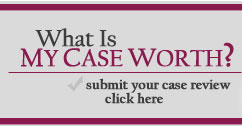We are a lawyer and attorney personal injury firm based in Las Vegas, Nevada.
What To Do If You Are In A Motor Vehicle Accident
When a motor vehicle accident occurs, it is easy to become confused and forget to acquire necessary information. Even a minor accident can leave people nervous and shaken. It's a good idea to keep a checklist of phone numbers to call and questions to ask in the same folder as your insurance papers, in your car glove compartment or console. Then when you need them, everything will be in one place.
- If anyone is injured, call the police for help and tell them you need medical
assistance. If anyone involved seems to be under the influence of drugs or
alcohol, tell that to the police when you call for help. Always call the police
whether there are injuries or not. Many insurance companies will not cover
an accident unless there is a police accident report. Once everyone is safe,
you can get the other information you will need.
- Your insurance company will need: Full names, addresses and phone numbers
of everyone involved, including drivers, passengers, pedestrians who might
have been involved, and any witnesses.
- Try to find out if anyone is injured or says he is injured; or if anyone said
"I am fine".
- Make as many notes as you can about the accident itself. Get information about
the other vehicles involved, such as license plate numbers, make and model.
What was the weather and lighting like at the time of the accident? Were any
of the involved vehicles damaged? Was any of the damage obviously prior to
the accident, such as tail lights or brake lights not functioning? Were any
of the vehicles company-owned?
- Be sure to find out the insurance status of all vehicles and persons involved.
If any drivers were not the registered owners, get the registered owners'
names, addresses, and phone numbers.
- Did anyone take blame for the accident?
- Get the names and badge numbers of any police officers who come to the scene.
- You may wish to contact a personal injury attorney immediately. He may wish
to examine the evidence at the site and gather as much information as possible.
- Contact your own insurance company as quickly as possible. If you feel that,
for any reason, your company may not be willing to cover the accident, you
should consider contacting a personal injury attorney first. However, do not
delay in contacting your insurance carrier. Most insurance companies have
requirements in the policy as to how quickly you must contact them, and failure
to do so might mean your claim will be rejected. On the other hand, you should
not answer any questions or make any statements to the other drivers' insurance
companies until you have consulted an attorney. Be polite, but decline to
discuss any aspects of the accident until you have obtained legal advice.
- If you have been seriously injured, you will probably be taken directly
to a hospital emergency room. If you are not seriously injured, however, do
not assume that you are uninjured. Many injuries from vehicle crashes, like
whiplash, do not show up right away. If you do begin to suffer ill effects
from the crash, notify your health professional immediately, get yourself
checked out, and follow the doctor's instructions as to care and follow-up.
Failure to get medical care might have serious consequences if you have latent
injuries that only show up 24-36 hours later. Do not neglect symptoms that
are unfamiliar, or pain that appears hours later. Report any symptoms to your
doctor, however slight. Serious back injuries can start out as nothing more
than an aching back, but left untreated they can cause major health difficulties.
Furthermore, if you do have problems your insurance company will need proof
that the problems were diagnosed and treated promptly, and that the problems
were related to the accident.
- If you can get a camera, it is wise to take as many photos as possible of
the accident site, the vehicles, and people involved, and any thing else that
might have bearing on how and why the accident occurred. Pictures taken as
soon as possible will be the most valuable. If you do not have a camera, you
might be able to buy a disposable one at a nearby convenience store, or ask
a passenger or bystander to purchase one for you. Don't forget to take pictures
of the damage done to all vehicles, license plates, evidence such as street
signs or lights, skid marks, etc. If you have an attorney you plan to call,
tell him you don't have a camera. He may be able to send someone from his
office to take the needed photographs. Be sure to also tell your attorney about
any other evidence you think might be important, such as faulty street lights
or signage, malfunctioning equipment (seat belts, turn signals, etc.), weather
conditions, etc.
|
       |


